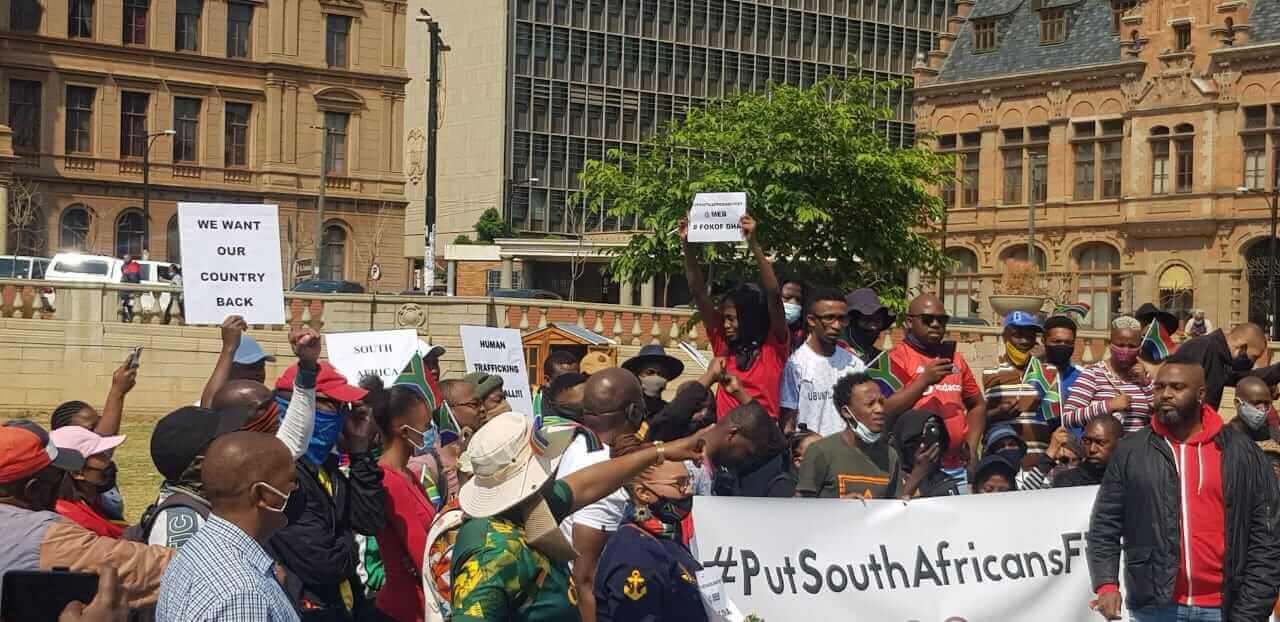Xenophobia is once again on the rise in South Africa, with several taking to the streets to voice their anger against the presence of foreigners in the country. At the same time, digital protests have also taken a hold of the country, with #NigeriansMustGo, #ForeignersMustGo, and #PutSouthAfricansFirst trending on social media.
Last week, demonstrators held a protest outside the Nigerian High Commission in Pretoria. They allege that Nigerians are disproportionately involved in criminal activities and are taking jobs away from South Africans. It is thought that this latest wave of xenophobic sentiment can be traced to the arrest of five Nigerians for running a human and sex trafficking ring that was masquerading as a ‘bed-and-breakfast’. Similar protests and xenophobic attacks were witnessed in South Africa in 2015, 2017, and 2019.
Nigeria has reacted strongly to the latest protests, with High Commissioner Bala Kabiru saying, “We Don’t accept the profiling of Nigerians in South Africa.”
Analysts have described these protests as “Afrophobia”, wherein Black South Africans blame their misfortunes on migrants and refugees from other African countries rather than government mismanagement or decades of racial inequality.
Hence, many have taken to pointing fingers at Nigerian and Zimbabwean citizens in the country. Officials in both countries are no doubt concerned that this will lead to an outbreak of violence in their countries.
For example, last year, attacks against foreigners in Johannesburg led to “violence and widespread looting of South African-owned” stores in Nigeria. This was in response to mobs in South Africa forcing hundreds of foreigners out of their homes and looting their stores.
At the time, Nigeria’s Minister of Information and Culture, Lai Mohammed called ensuing ‘retaliatry’ acts of violence in Nigeria “deeply disturbing” and counter-productive, given that these South African businesses employ mostly Nigerian citizens. He likened it to “a classic case of cutting off your nose to spite your face”.
Nevertheless, these recent attacks also threaten to derail diplomatic ties between the two countries. Last year, Nigerian President Muhammadu Buhari held emergency talks with his South African counterpart Cyril Ramaphosa. However, Nigeria still withdrew from participating in the World Economic Forum event in Cape Town, said it would recall its ambassador, and that it would be repatriating roughly 600 citizens from South Africa. Likewise, Nigerian artists like Burna Boy and Tiwa Savage said they would not perform in South Africa.
South Africa, too, closed its embassy in Nigeria following attacks on South African-owned stores in the country.
Like in Nigeria, similar counter-protests to xenophobia in South Africa have also emerged in Zambia, whose citizens have also been targeted in the Ramaphosa-led state. It is imperative that these African nations come together to quell tensions before the situation gets out of hand, both from a law and order and a diplomatic perspective
Xenophobic Protests on the Rise in South Africa Once More
Similar protests and xenophobic attacks were also witnessed in South Africa in 2015, 2017, and 2019.
September 30, 2020

SOURCE: AFRICA FEEDS
